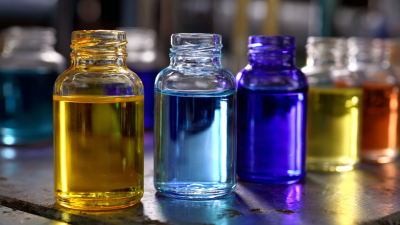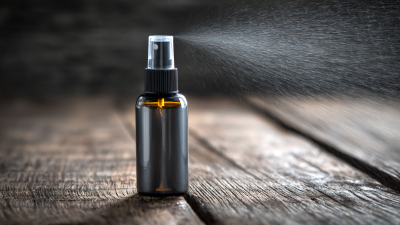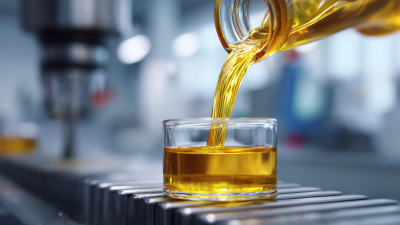Understanding the Importance of Vacuum Pump Lubricants for Optimal Performance
Table of Contents
- Types of Vacuum Pump Lubricants and Their Functions
- Key Ingredients in Vacuum Pump Lubricants
- Comparative Analysis of Mineral vs. Synthetic Lubricants
- Impact of Lubricant Quality on Vacuum Pump Efficiency
- Best Practices for Lubricant Maintenance and Replacement
- Common Challenges in Vacuum Pump Lubricant Usage
- The Essential Guide to ACPL-312S Compressor Lubricant: Benefits, Applications, and Maintenance Tips
- FAQS
- Conclusion
- Related Posts
When it comes to industrial applications, the performance and lifespan of vacuum systems really depend a lot on the quality of the vacuum pump lubricant you're using. I’ve read reports from the International Journal of Precision Engineering and Manufacturing that say if lubrication isn’t up to par, it can actually cut efficiency by around 30% and cause more wear and tear on those pump parts. At Shanghai Jiongcheng Industrial Co., Ltd., we totally get how important this is. That’s why we focus on developing high-performance lubricants specifically designed for vacuum pumps—because keeping your systems running smoothly really matters. We put a lot of effort into using the latest research and strict quality checks to make sure our lubricants—whether for compressors or refrigerated systems—offer great protection and boost efficiency. Our goal is to stay innovative and deliver top-notch products, so industries can trust their vacuum systems will perform reliably and last longer.

Types of Vacuum Pump Lubricants and Their Functions
Vacuum pump lubricants are pretty important when it comes to keeping those pumps running smoothly and lasting longer. There’s a bunch of different types out there, each suited for a specific kind of job. The most common ones you’ll hear about are mineral oils, synthetic oils, and solid lubricants.
Mineral oils are kind of the go-to for many folks because they do a good job of lubricating and are usually easy on the wallet. They work well for standard vacuum pumps and tend to perform reliably across a range of conditions. Now, synthetic oils are a bit more high-tech. They handle extreme temperatures better, meaning they don’t break down as easily when things get hot or cold. Plus, they’re less likely to cause oxidation or form sludge, so your pump stays cleaner and runs more efficiently. As for solid lubricants, things like graphite come into play in specialized cases where liquids just don’t cut it. They help reduce friction and offer protection, even under really high pressures.
All these lubricants play their own special role—whether it's reducing wear and tear, helping with heat, or preventing rust. Picking the right one depends on what your pump needs, but understanding these differences can really help ensure your equipment performs at its best and lasts longer. Trust me, a little knowledge can go a long way in keeping things running smoothly in the long run.
Key Ingredients in Vacuum Pump Lubricants
Vacuum pump lubricants really play a vital role in keeping your equipment running smoothly and lasting longer. The key ingredients in these lubricants are specially designed to boost efficiency and cut down on wear and tear. For example, many high-performance lubes use base oils like polyalphaolefins (PAOs), which are popular because they handle high temperatures well and don’t evaporate easily. In fact, according to a report from a leading research firm, using PAOs can cut friction losses in vacuum pumps by up to 30%. That’s a big deal when it comes to saving energy and improving performance.
Another important ingredient you’ll find in these lubricants is anti-wear additives, like zinc dialkyldithiophosphate (ZDDP). A study published in the Journal of Lubrication Science pointed out that ZDDP helps extend the lifespan of vacuum pumps by creating a protective layer on metal surfaces—kind of like giving the parts a shield. This layer helps prevent metal-on-metal contact, which can really wear things down, reducing wear rates by as much as 50%. Plus, these lubricants often include anti-oxidation agents, which stop the oil from breaking down when things get hot, ensuring everything keeps running smoothly no matter the conditions. Knowing what’s inside these lubes can really help manufacturers choose the right one for their specific needs, leading to better productivity and saving some cash in the long run.
Importance of Vacuum Pump Lubricants for Optimal Performance
Comparative Analysis of Mineral vs. Synthetic Lubricants
When you compare mineral and synthetic lubricants, there are some pretty important factors to consider, especially when it comes to how well vacuum pumps perform. Mineral oils, which come from refining crude oil, usually do the trick for everyday, standard applications. But here’s the thing—they might not hold up so great under really tough conditions, like high heat or volatile environments. Over time, their performance can start to decline, leading to more wear and tear on the equipment. That’s not ideal because it can shorten the lifespan of your pump and affect how efficiently it runs.
On the flip side, synthetic lubricants are pretty much the overachievers in this game. They’re specially formulated with additives that boost their stability and ability to handle rough conditions. This means less friction, better efficiency, and generally a longer-lasting lubricant. That's especially important for vacuum pumps, where keeping friction low is key. Plus, synthetic oils often mean you won’t need to do maintenance as often, saving some cash over the long haul. As more folks are diving into the world of engine oils and lubricants, understanding the differences between these two types is super important if you want your equipment to run smoothly and last as long as possible.
Impact of Lubricant Quality on Vacuum Pump Efficiency
You know, when it comes to vacuum pumps, the quality of the lubricant you're using really makes a big difference in how well they perform. Honestly, good lubricants are key—they help cut down on friction between moving parts, which means less wear and tear over time. This is especially true in setups where precision and reliability are a big deal. Plus, the right lubricant can help get rid of the heat that builds up during operation, keeping the pump running at a steady temp and boosting its overall efficiency.

On top of that, the formulation of the lubricant really affects how well it holds up under the tough conditions you often see in vacuum environments. Lower-quality lubricants tend to get contaminated or break down faster, which can mess with performance and even cause breakdowns. So, it’s super important to pick a lubricant that's specifically suited to your vacuum pump’s needs. Investing in high-quality lubricants isn’t just about extending the life of your equipment; it also leads to more consistent performance, fewer problems, and ultimately, save you some cash on maintenance and energy costs—that payoff is pretty worth it.
Best Practices for Lubricant Maintenance and Replacement
Keeping your vacuum pumps running smoothly really comes down to staying on top of the lubricant. It’s super important to regularly check that your lubricant levels are good and that the oil or grease isn’t contaminated – things like dirt, moisture, or debris can really mess with how well it works. Setting up a simple routine, like doing visual inspections and testing the viscosity every now and then, can help catch any problems early on. That way, you’re not just fixing issues later, but actually making your lubricant and pump last longer.
On top of that, it’s key to know what your specific vacuum pump needs. Different pumps might require lubricants with particular qualities—maybe low vapor pressure or resistance to certain chemicals. Following the manufacturer's recommendations for how often to change the lubricant is usually a good idea to keep everything running smoothly. Honestly, investing a bit of time into these simple practices can really make a difference. It boosts your pump’s efficiency, makes your operation more reliable, and in the long run, can save you a ton of money.
Common Challenges in Vacuum Pump Lubricant Usage
Talking about vacuum pump lubricants, there are a few common hiccups that can mess with their performance. One biggie is how the lubricant tends to break down over time, especially when things get hot or if contaminants sneak in. This can cause the oil to thin out or lose its lubricating punch, which means more wear and tear on the pump parts. And let’s be honest, if the lubrication isn’t up to snuff, the pump starts acting flaky—performance becomes inconsistent, and you never really know if it’s gonna hold up when you need it most.
Then there’s the tricky part of actually picking the right lubricant for your specific setup. Not all vacuum pumps are the same, so they often need different kinds of oil depending on things like operating temperature or pressure. Give the wrong one, and it could hamper efficiency or even cause damage. At Shanghai Jiongcheng Industrial Co., Ltd., we totally get these nuances. That’s why we offer advanced lubricants specially designed for various compressor and vacuum pump applications. We use the latest tech and strict quality control to make sure our products keep things running smoothly—no surprises or unexpected hiccups along the way.
Basically, understanding these challenges and having the right solutions definitely makes a difference when it comes to keeping your vacuum pumps in top shape.

The Essential Guide to ACPL-312S Compressor Lubricant: Benefits, Applications, and Maintenance Tips
The ACPL-312S compressor lubricant is an essential product for ensuring optimal performance and longevity of various compressor systems. Its formulation, which incorporates three kinds of hydrogenated base oil, enhances the lubricant's stability and oxidative resistance, making it an ideal choice for demanding operating conditions. According to a recent report by the Society of Tribologists and Lubrication Engineers (STLE), lubricants featuring hydrogenated base oils have demonstrated significant improvements in wear protection and reduced friction, extending the life of machinery components by up to 30%.
In addition to its robust base oil composition, the ACPL-312S also includes high-performance compound additives. These additives are designed to enhance the lubricant's overall performance by providing superior thermal stability, preventing rust and corrosion, and maintaining viscosity over a wide temperature range. A study by the American Petroleum Institute (API) noted that the incorporation of advanced additive technology in compressor lubricants can lead to decreased energy consumption by as much as 15%, which translates into substantial cost savings and improved efficiency for industrial applications.
Maintenance of systems utilizing ACPL-312S lubricant is straightforward but critical. Regular monitoring of lubricant levels and periodic oil changes, as recommended by manufacturers, help ensure sustained performance. Furthermore, consistent lubricant quality checks can prevent common issues such as foaming, which is often exacerbated by contamination and can lead to decreased compressor efficiency. Emphasizing proper maintenance practices is crucial for leveraging the full benefits of this high-quality lubricant, ultimately promoting a more sustainable operational environment.
FAQS
: The main types of vacuum pump lubricants include mineral oils, synthetic oils, and solid lubricants.
Mineral oils are widely used due to their excellent lubricating properties and cost-effectiveness, making them suitable for standard vacuum pumps under various operating conditions.
Synthetic oils provide superior thermal stability, lubrication at extreme temperatures, and reduce oxidation and sludge formation, making them ideal for high-performance applications.
Solid lubricants, such as graphite, are used in specialized situations where liquid lubricants may fail, offering friction reduction and protection under high pressures.
Base oils like polyalphaolefins (PAOs) are favored for their excellent thermal stability and low volatility, which can reduce friction losses in vacuum pumps by up to 30%.
Anti-wear additives such as zinc dialkyldithiophosphate (ZDDP) extend the service life of vacuum pumps by creating a protective film that minimizes direct contact and reduces wear rates by up to 50%.
High-quality lubricants reduce friction, minimize wear and tear, and assist in heat dissipation, significantly enhancing the overall efficiency and reliability of vacuum pumps.
Contaminants can compromise the effectiveness of lower-quality lubricants, leading to operational inefficiencies and potential breakdowns.
Choosing the appropriate lubricant for specific vacuum pump applications is essential for maintaining optimal performance, prolonging pump life, and ensuring consistent reliability.
Investing in high-grade lubricants can lead to reduced maintenance needs and enhanced output efficiency, ultimately resulting in cost savings.
Conclusion
Vacuum pump lubricants are pretty crucial when it comes to keeping your vacuum pumps running smoothly. They help cut down on friction and wear, which basically means the equipment lasts longer and works more efficiently. There are different kinds out there — like mineral and synthetic lubricants — each with their own unique roles and ingredients, especially when it comes to handling different operating conditions. If you ask me, while mineral options might be lighter on the wallet, synthetic lubricants tend to handle heat better and resist breaking down, making them the go-to for high-performance setups.
The quality of your lubricant really makes a difference in how well your vacuum system works. That’s why regular maintenance and swapping it out on time is super important — it helps avoid issues like contamination or degradation. Staying on top of lubricant management isn’t just good practice; it’s key to keeping everything running smoothly. Over at Shanghai Jiongcheng Industrial Co., Ltd., we use cutting-edge tech and top-grade chemicals to craft reliable vacuum pump lubricants that meet industry standards. Our goal? Helping our clients get the best possible performance from their equipment, every time.
Related Posts
-

Unlocking Industry Potential at the 138th China Import and Export Fair with Becker Vacuum Pump Lubricant
-

How to Choose the Right Elmo Rietschle Vacuum Pump Lubricant for Your Needs
-

Understanding the Best Benchtop Dust Collector: Key Features and Industry Insights
-

How to Safely Handle Mineral Oil Flammable in Industrial Applications
-

5 Hidden Benefits of Using Synthetic Lubricant Spray You Never Knew About
-

Understanding the Benefits of Purified Mineral Oil in Modern Applications
Blog Tags:

